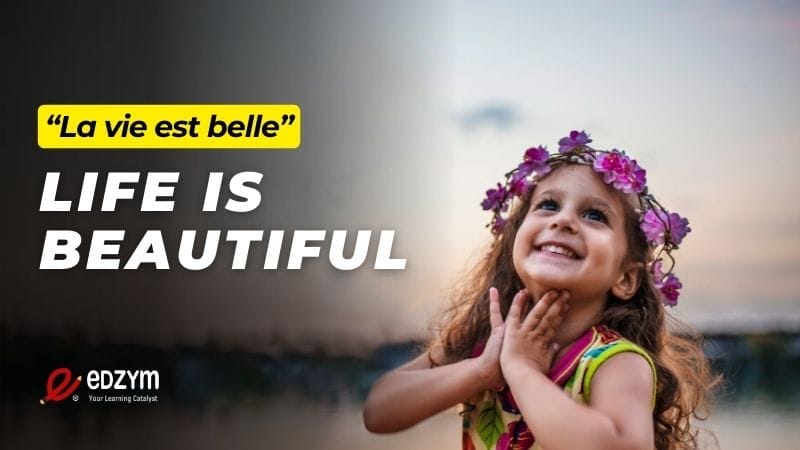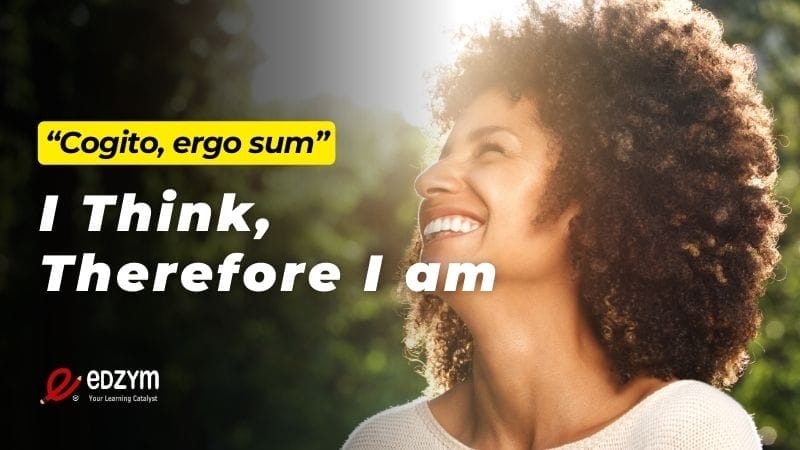Famous French Quotes with English Meanings and Insights
French quotes are more than just words; they capture the essence of French culture and literature. From philosophical ponderings to poetic expressions, these quotes have shaped French identity and influenced minds worldwide. In this page, we delve into the world of famous French quotes, uncovering their meanings and exploring their cultural impact. Join us as we journey through the French words that have left a lasting imprint on literature, philosophy, and the human spirit.
31 French Quotes on Life and Their Meanings
French culture is celebrated for its eloquent expressions that convey profound wisdom and insight. Here are a few iconic French quotes that resonate globally, along with their translations, interpretations, and historical contexts:

- “La vie, c’est comme une bicyclette, il faut avancer pour ne pas perdre l’équilibre.”
- Translation: “Life is like riding a bicycle, to keep your balance, you must keep moving.”
- Interpretation: This quote by Albert Einstein suggests that continuous effort and progress are essential to maintaining stability and growth in life.
- “Le plus grand risque est de ne prendre aucun risque.”
- Translation: “The biggest risk is not taking any risk.”
- Interpretation: This quote encourages courage and emphasizes that avoiding risks altogether may lead to missed opportunities and stagnation.
- “Liberté, égalité, fraternité.”
- Translation: “Liberty, equality, fraternity.”
- Interpretation: This motto encapsulates the core values of the French Republic, stemming from the French Revolution. It emphasizes the principles of liberty (freedom), equality (equality before the law), and fraternity (solidarity among citizens). It remains a rallying cry for democracy and human rights worldwide.
- “Vouloir, c’est pouvoir.”
- Translation: “To want is to be able to.”
- Interpretation: This proverb encourages determination and belief in one’s abilities. It implies that having a strong will or desire can empower individuals to achieve their goals.
- “Joie de vivre.”
- Translation: “Joy of living” or “Zest for life.”
- Interpretation: This phrase embodies a philosophy of enjoying life to the fullest, savoring its pleasures and embracing positivity.
- “Plus ça change, plus c’est la même chose.”
- Translation: “The more things change, the more they stay the same.”
- Interpretation: This expression highlights the idea that despite outward changes, fundamental aspects often remain unchanged or revert to their original state.
- “Carpe diem.”
- Translation: “Seize the day.”
- Interpretation: This phrase encourages living in the present moment and making the most out of each day, emphasizing the importance of not procrastinating or taking opportunities for granted.
- “Rien ne sert de courir, il faut partir à point.”
- Translation: “There’s no use in running, one must depart on time.”
- Interpretation: Advises against rushing or acting impulsively; instead, it suggests the importance of timing and preparation.
- “Tout vient à point à qui sait attendre.”
- Translation: “Everything comes to those who wait.”
- Interpretation: Patience is key in life; waiting for the right moment often yields better results than rushing into things prematurely.
- “Chacun voit midi à sa porte.”
- Translation: “Each person sees noon at their own door.”
- Interpretation: Everyone views things from their own perspective, influenced by their surroundings and experiences.
- “C’est la vie.”
- Translation: “That’s life.”
- Interpretation: Used to express acceptance of situations that cannot be changed, acknowledging life’s ups and downs with a philosophical attitude.
- “Après la pluie, le beau temps.”
- Translation: “After rain comes fair weather.”
- Interpretation: This proverb reminds us that difficult times will eventually pass, giving way to better and brighter days ahead.
- “Qui vivra verra.”
- Translation: “Who lives will see.”
- Interpretation: Time will reveal the outcome or truth of a situation; it emphasizes the uncertainty of the future.
- “La vie est faite de petits bonheurs.”
- Translation: “Life is made of small pleasures.”
- Interpretation: Happiness and fulfillment can be found in simple, everyday moments rather than in grand achievements.
- “Il faut cultiver notre jardin.”
- Translation: “We must cultivate our garden.”
- Interpretation: From Voltaire’s “Candide,” this phrase suggests focusing on one’s own responsibilities and cultivating one’s own happiness.
- “L’avenir appartient à ceux qui se lèvent tôt.”
- Translation: “The future belongs to those who rise early.”
- Interpretation: Success often comes to those who are diligent and proactive in pursuing their goals.
- “Vivre, c’est vieillir.”
- Translation: “To live is to age.”
- Interpretation: Life inevitably involves growing older; it reminds us of the passage of time and the changes it brings.
- “Il faut imaginer Sisyphe heureux.”
- Translation: “One must imagine Sisyphus happy.”
- Interpretation: From Albert Camus, this suggests finding contentment and purpose even in repetitive or seemingly futile tasks.
- “Soyez vous-même, tous les autres sont déjà pris.”
- Translation: “Be yourself, everyone else is already taken.”
- Interpretation: Encourages authenticity and embracing one’s individuality rather than trying to imitate others.
- “On ne voit bien qu’avec le cœur.”
- Translation: “One sees clearly only with the heart.”
- Interpretation: From “The Little Prince” by Antoine de Saint-Exupéry, this emphasizes the importance of intuition and emotional understanding.
- “La vie est belle.”
- Translation: “Life is beautiful.”
- Interpretation: This simple yet profound statement celebrates the joy and beauty of life itself, despite its hardships and uncertainties.
- “À cœur vaillant, rien d’impossible.”
- Translation: “To a valiant heart, nothing is impossible.”
- Interpretation: Courage and determination can overcome any obstacle or challenge.
- “La vie est un sommeil, l’amour en est le rêve.”
- Translation: “Life is a sleep, and love is its dream.”
- Interpretation: From Alfred de Musset, this poetic line compares life to a fleeting dream, highlighting the ephemeral nature of existence.
- “Le véritable voyage de découverte ne consiste pas à chercher de nouveaux paysages, mais à avoir de nouveaux yeux.”
- Translation: “The real voyage of discovery consists not in seeking new landscapes, but in having new eyes.”
- Interpretation: Marcel Proust suggests that true exploration and growth come from changing our perspective and seeing familiar things in new ways.
- “Le bonheur est parfois caché dans l’inconnu.”
- Translation: “Happiness is sometimes hidden in the unknown.”
- Interpretation: Encourages openness to new experiences and embracing uncertainty, as happiness may arise unexpectedly.
- “Il n’y a qu’un bonheur dans la vie, c’est d’aimer et d’être aimé.”
- Translation: “There is only one happiness in life, to love and be loved.”
- Interpretation: From George Sand, this quote emphasizes the importance of love and human connection as fundamental sources of happiness.
- “Tout est bien qui finit bien.”
- Translation: “All’s well that ends well.”
- Interpretation: Optimistically suggests that as long as a situation concludes positively, the difficulties along the way are justified.
- “Les grands esprits se rencontrent.”
- Translation: “Great minds think alike.”
- Interpretation: Suggests that individuals of similar intellectual caliber or perspective often arrive at the same conclusions.
- “Chaque jour est une vie.”
- Translation: “Every day is a life.”
- Interpretation: Encourages making the most out of each day and appreciating the richness of everyday experiences.
- “On ne change pas une équipe qui gagne.”
- Translation: “Don’t change a winning team.”
- Interpretation: Advises against making unnecessary changes when a situation or strategy is already successful.
- “Qui sème le vent récolte la tempête.”
- Translation: “He who sows the wind reaps the storm.”
- Interpretation: Warns about the consequences of one’s actions; negative actions or behaviors can lead to severe repercussions.

These famous French quotes not only showcase linguistic elegance but also encapsulate universal truths and philosophical insights that continue to resonate with people worldwide. They reflect the depth of French culture and its contributions to global thought, literature, and human expression.
If you want to better understand this article, which features French alphabets and words, we recommend learning French with our experienced tutors.
Categories of French Quotes
Philosophical Quotes:
French philosophers have crafted quotes that resonate deeply with humanity’s search for meaning and understanding. Here are insights into some renowned philosophers and their impactful quotes:

- Voltaire: “Il est aussi désagréable de se faire voler une citation que de l’argent.”
- Meaning in English: “It is as unpleasant to be robbed of a quotation as of money.”
- Philosophical Idea: Voltaire, known for his wit and criticism of authority, encourages critical thinking and skepticism. This quote challenges the notion of blindly accepting answers and promotes inquiry and introspection.
- Impact: It has inspired generations to question authority, seek truth independently, and value intellectual curiosity over conformity.
- René Descartes: “Cogito, ergo sum.”
- Meaning in English: “I think, therefore I am.”
- Philosophical Idea: Descartes’ assertion in his “Meditations on First Philosophy” is a foundational concept in modern philosophy. It emphasizes the primacy of individual consciousness and self-awareness as the basis of existence.
- Impact: This quote revolutionized philosophical thinking by introducing the idea of subjective reality and the importance of introspection and doubt in philosophical inquiry.
- Jean-Paul Sartre: “L’enfer, c’est les autres.”
- Meaning in English: “Hell is other people.”
- Philosophical Idea: Sartre, a key figure in existentialism, posits that individuals create their essence or identity through their actions and choices, rather than having a predetermined essence assigned by external forces.
- Impact: This quote challenges traditional notions of human nature and free will, influencing existentialist thought and broader philosophical discourse on personal responsibility and authenticity.
These philosophical quotes not only encapsulate profound ideas but also continue to shape intellectual thought and inspire individuals to contemplate their existence, values, and place in the world.
Literary Quotes:
French literature is rich with quotes that capture the essence of human emotions, societal reflections, and existential ponderings. Here are some quotes from renowned French authors, along with their contexts and underlying themes:
- Victor Hugo: “Laughter is the sun that drives winter from the human face.”
- Context: This quote is from Hugo’s novel “Les Misérables,” where it reflects the contrast between suffering and hope in the lives of the characters.
- Themes and Symbolism: It symbolizes resilience and optimism in the face of adversity, highlighting the transformative power of joy and human connection.
- Marcel Proust: “Le véritable voyage de découverte ne consiste pas à chercher de nouveaux paysages, mais à avoir de nouveaux yeux.” (“The real voyage of discovery consists not in seeking new landscapes, but in having new eyes.”)
- Context: This quote comes from Proust’s monumental work “À la recherche du temps perdu” (“In Search of Lost Time”), where the narrator reflects on the nature of perception and memory.
- Themes and Symbolism: It explores the idea of personal growth and self-discovery through introspection and a renewed perspective on life and experiences.
- Albert Camus: “Au milieu de l’hiver, j’ai découvert en moi un invincible été.” (“In the midst of winter, I found there was, within me, an invincible summer.”)
- Context: This quote is from Camus’ philosophical essay “Return to Tipasa,” where he reflects on finding inner strength and resilience amidst challenging circumstances.
- Themes and Symbolism: It symbolizes hope, resilience, and the capacity for human spirit to endure hardships and find meaning in life’s struggles.
These quotes not only reveal the literary prowess of their authors but also convey universal truths about the human condition, emotions, and existential dilemmas. They continue to resonate with readers worldwide, inspiring reflection and introspection on life’s complexities and enduring themes.
Cultural Quotes:
French culture is imbued with quotes that encapsulate its values, traditions, and expressions. Here are some notable quotes that reflect aspects of French culture:
- Molière: “Le vrai peut quelquefois n’être pas vraisemblable.” (“The true may sometimes not be probable.”)
- Context: Molière, a renowned playwright of the French classical period, often explored the complexities of human nature and societal norms in his comedies.
- Everyday Context: This quote reflects a cultural appreciation for wit and irony in French literature and theater. It suggests that truth can be found in unexpected places or circumstances, challenging conventional wisdom.
- Charles de Gaulle: “La France ne peut être la France sans la grandeur.” (“France cannot be France without greatness.”)
- Context: De Gaulle, a prominent French statesman and military leader, made this statement during his presidency, emphasizing France’s historical legacy and global influence.
- Everyday Context: This quote resonates with French nationalism and pride in the country’s cultural and historical achievements. It underscores the importance of maintaining France’s stature on the world stage.
- Antoine de Saint-Exupéry: “On ne voit bien qu’avec le cœur. L’essentiel est invisible pour les yeux.” (“One sees clearly only with the heart. What is essential is invisible to the eye.”)
- Context: Saint-Exupéry, best known for “Le Petit Prince” (“The Little Prince”), explores themes of love, friendship, and the human condition in his writings.
- Everyday Context: This quote reflects French cultural values of introspection, emotional depth, and the importance of human connections over material possessions. It emphasizes the beauty of seeing beyond appearances to grasp deeper truths and meanings.
These cultural quotes not only provide insights into French perspectives on life and society but also serve as touchstones for understanding the nuances of French language, literature, and national identity. They continue to influence and inspire discussions on French culture both within the country and beyond its borders.
Impact and Legacy of French Quotes
French quotes have left an indelible mark on global literature, philosophy, and culture, influencing thought and creativity across continents. Here’s an exploration of their enduring impact, relevance in contemporary society, and adaptations in popular culture:
- Literature and Philosophy:
- Influence: French literature, renowned for its depth and sophistication, has been a cornerstone of world literature. Quotes from French authors like Voltaire, Descartes, and Camus have shaped philosophical discourse, challenging conventions and inspiring intellectual exploration.
- Relevance: These quotes continue to resonate due to their universal themes of existentialism, humanism, and social critique. They provoke introspection and debate on issues ranging from ethics to the nature of reality.
- Adaptations: Many literary works featuring French quotes have been adapted into films, plays, and artistic interpretations, keeping their messages alive and accessible to new generations.
- Cultural Influence:
- Global Reach: French cultural values and expressions, encapsulated in quotes like “Liberté, égalité, fraternité” and “Joie de vivre,” have transcended national borders. They embody ideals of liberty, equality, and the joy of life that resonate universally.
- Modern Relevance: In contemporary society, these quotes are referenced in discussions on politics, human rights, and personal philosophy. They serve as rallying cries for social justice and expressions of individual and collective identity.
- Pop Culture: French quotes frequently appear in popular culture, music, fashion, and advertising. They add sophistication and authenticity, tapping into the allure of French language and culture in global markets.
- Artistic and Media Adaptations:
- Literary Adaptations: Classic French literary works containing iconic quotes have been adapted into films, inspiring visual interpretations that amplify their impact.
- Musical Influence: French quotes and cultural references appear in lyrics of songs across genres, adding layers of meaning and cultural richness.
- Visual Arts: Artists draw inspiration from French quotes, integrating them into paintings, sculptures, and multimedia installations that explore themes of identity, society, and human emotion.
Overall, French quotes continue to exert a profound influence on global culture and thought, transcending their origins to become enduring symbols of intellectual inquiry, cultural identity, and artistic expression. Their adaptability ensures their relevance in an ever-changing world, ensuring that their messages of wisdom, beauty, and humanity endure for generations to come.
Conclusion
French quotes stand as luminous reflections of literature, philosophy, and cultural identity, encapsulating timeless wisdom and universal truths. They invite exploration into the rich tapestry of human thought and emotion, providing profound insights into the complexities of life. Whether you seek to uncover the philosophical depth of Descartes or the lyrical beauty of Hugo, delving into French quotes promises a journey of discovery and enrichment. Join our personalized online French class to embark on this transformative learning experience. Fill in the form below to schedule a personalized free French class for you and begin your exploration of the language and culture that has inspired minds for centuries.







